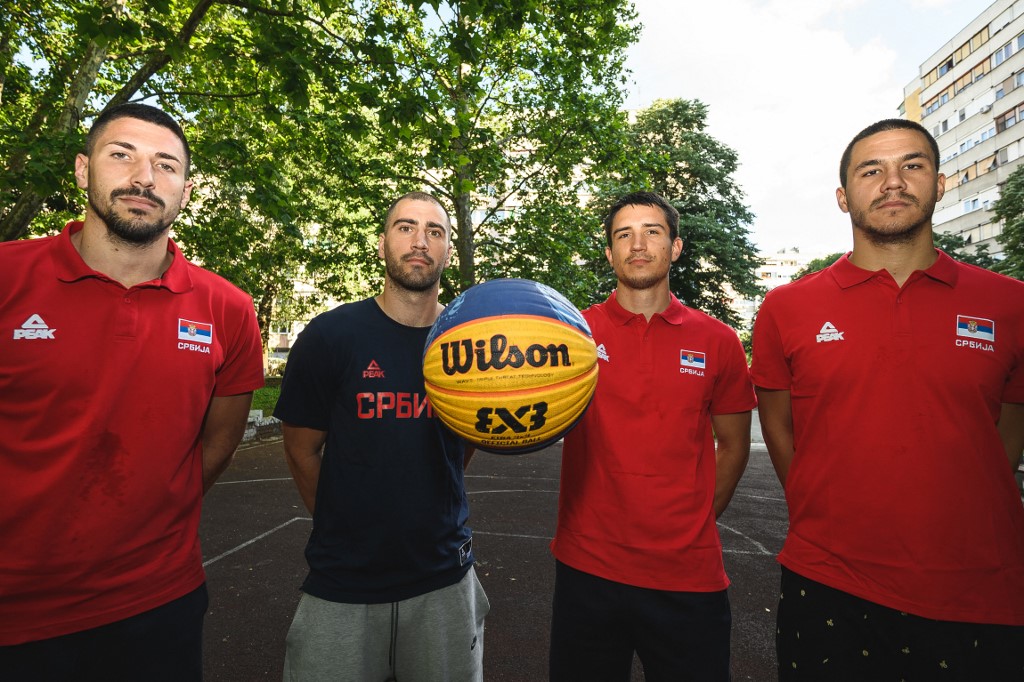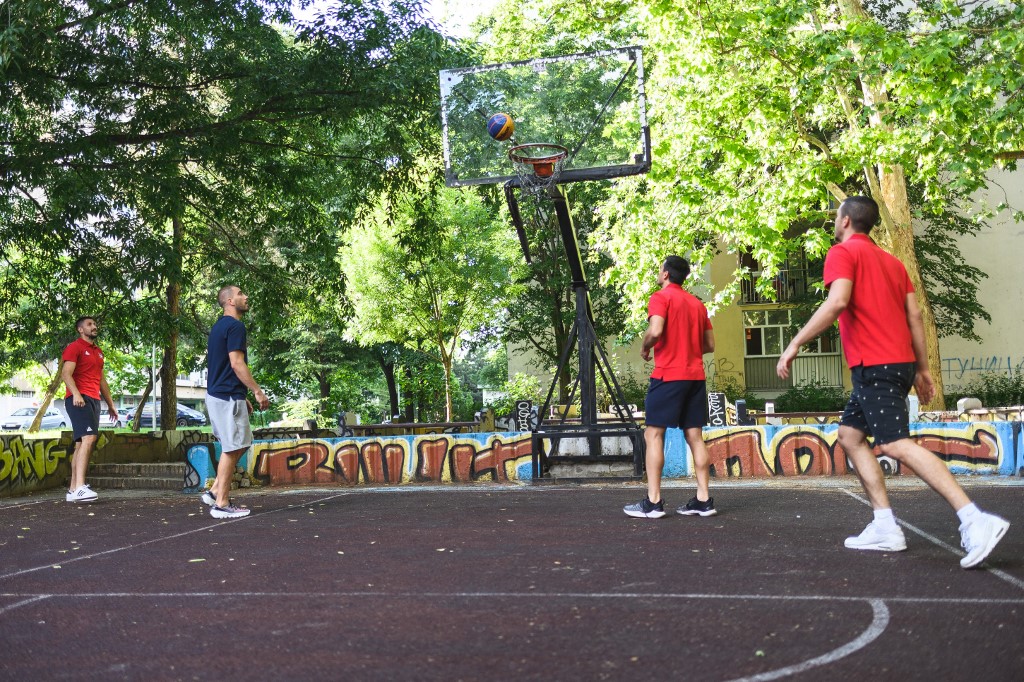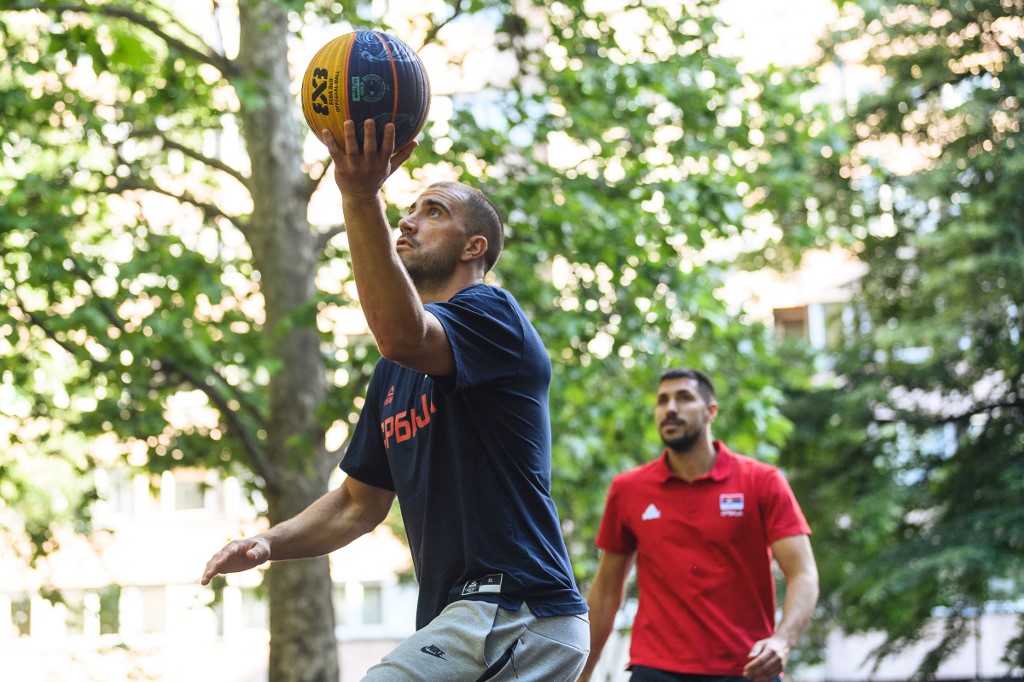‘Punk rock’ hoops: Serbia aims for 3×3 basketball Olympic glory

Serbia’s 3×3 basketball national team players (From L) Aleksandar Ratkov, Dusan Bulut, Stefan Stojacic and Miahilo Vasic pose for a photograph in Novi Sad on June 7, 2021. (Photo by Andrej ISAKOVIC / AFP)
Four friends shoot hoops on a shady court tucked between housing blocks in northern Serbia, but this is not a casual afternoon get-together — the men are training for the Olympics.
The game, called 3×3 basketball, is played by millions on street courts across the world but has struggled for recognition since its first professional tournament in 2012.
Article continues after this advertisementWhile basketball is played on a full court with two hoops and five players on each side, the 3×3 version is on a half-size court with two teams of three shooting at the same basket.
This summer, 3×3 will make its Olympic debut at the Tokyo Games — and Serbia is the runaway favorites for gold.
“We’re absolutely dominant. Anything apart from the first place would be considered a failure”, says Dusan Bulut, the number one ranked player in the world.
Article continues after this advertisementThe Balkan nation has won four out of six World Cups and currently tops the team and player rankings.
In fact, four out of the top five players in the world, including Bulut, are Serbian.
‘Think fast, be cheeky’

Serbia’s 3×3 basketball national team trains on a basketball court in Novi Sad on June 7, 2021. (Photo by Andrej ISAKOVIC / AFP)
“While I was growing up, there was a basketball court in every block in my neighbourhood,” Bulut tells AFP, standing on the court where he played as a child.
He has since refurbished it, with his nickname “Bulut-proof” inscribed on concrete blocks around the court.
“But we spent a lot of time on this particular one. We’d come here when we skipped school because nobody could see us.”
Before reaching stardom in 3×3, Bulut, now 35, was a struggling point guard whose basketball career included stints in Serbia and North Macedonia.
“I wasn’t happy with my life and the path which my career took,” Bulut says.
“I simply realised that I had attributes which should make me successful, but the opportunity never came.”
He left to pursue a career in street basketball and never looked back.
However, Bulut insists the game he once described as the “punk rock” of the basketball world is not a discipline for rejects, but a game that requires players to “think fast and be cheeky”.
“It’s about personal expression and creativity, whereas basketball is more systematic and complex,” says Bulut.
And the training regime and schedule are as punishing as any other sport, adds Bulut’s teammate, 29-year-old Aleksandar Ratkov.
“When there was no Covid-19, we would travel a lot during a season, as much as tennis pros do,” he says.
‘Turning point’

Serbia’s 3×3 basketball national team player Dusan Bulut (L) controls the ball during a training in Novi Sad on June 7, 2021. (Photo by Andrej ISAKOVIC / AFP)
But no matter if it is one or two hoops, players from the Balkan country are excelling in the NBA.
Denver Nuggets big man Nikola Jokic recently scooped the NBA Most Valuable Player award, Vasilije Micic of Turkish club Anadolu Efes was voted best player in the Euroleague and Dusan Bulut tops the world rankings in 3×3 basketball.
The country was a major basketball name even during the days of Yugoslavia, when the socialist authorities provided a court in almost every neighbourhood.
Many future stars grew up on these courts, relentlessly copying their idols and playing amateur street basketball tournaments.
During the 1990s, the golden era for basketball in Serbia, the game also provided relief for young people from the extreme nationalist regime of Slobodan Milosevic.
“Basketball is a sport where you constantly face difficult situations, and I think the way of life in Serbia is just like that,” says Bulut.
“For us, it’s a normal way of functioning, and we just transmit that to the court.”
But the transition from street sport to the Olympics inevitably brings new pressures.
Players who had until recently never even dreamt of playing in the Olympics now see winning gold as an imperative — but they are also excited at the recognition for their game.
“I think this sport will flourish after the Olympics,” 27-year old Mihailo Vasic told AFP.
“Most people are not yet familiar with it, but I believe the Games will be a turning point.”